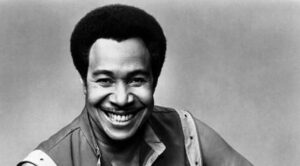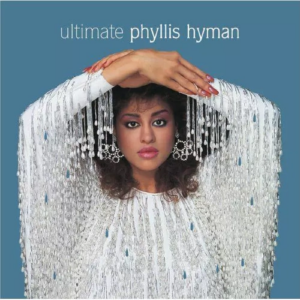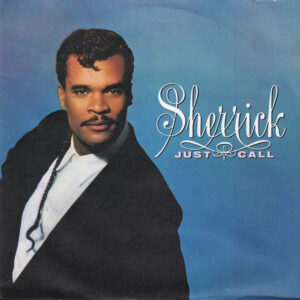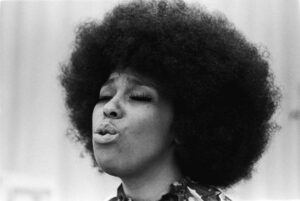The most anticipated soul music album of 2008 has arrived. Ever since Angela Johnson released her outstanding debut, They Don’t Know (2002), the prolific singer/songwriter/musician/producer has been cooking up a spicy stew of tracks for some of the most admired artists in the indie soul community. Listeners have waited patiently and now, following her acclaimed Got to Let It Go (2005), the impressive gamut of Angela Johnson’s talents is in full, brilliant display on Angela Johnson presents "A Woman’s Touch" Vol. 1.
For those who happened to miss the label copy on Johnson’s first two efforts, A Woman’s Touch might be a revelation, for Angela Johnson’s songwriting and production skills are the star of this project. (She also sings lead on three of the album’s fourteen tracks.) Fans who know Johnson’s work with Cooly’s Hot Box can attest that she’s always possessed an identifiable sound. On Take It (2002) and Don’t Be Afraid-Get On (2004), songs like "Happy Feelings" and "Wait 4 U" brimmed with Johnson’s trademark chord changes and playful bass lines, laying the foundation for Johnson’s two full-length solo projects. A who’s who of contemporary artists adds their own distinct voice to what might be called the "Angela Johnson sound" on A Woman’s Touch.
No stranger to a hook, Rahsaan Patterson kicks off the proceedings with "Dream Flight," a top-to-bottom collaboration with Johnson. The song is a rousing antidote to the increasingly troubled headlines we face every day, with a groove that seems to glisten sunrays in the midst of despair. One of the album’s most thrilling moments arrives at the song’s break, when a blistering guitar solo and Patterson’s multi-tracked voice take a magic carpet detour towards psychedelic-soul. Johnson and Patterson are a dynamic duo whose talents and influences clearly complement each other. Hopefully "Dream Flight" will spawn more soulful offspring between the two.
Equally at home in Johnson’s playground is Claude McKnight. The Take 6 vocalist brings a sensitive yet passionate voice to "Here I Stand," bearing the healed wounds of life’s inevitable peaks and valleys. "That’s Just the Way," featuring vocals by flautist and frequent Johnson collaborator Monet, successfully mines similar inspirational territory but through a slightly funkier lens.
The "secret weapons" of Angela Johnson’s live performances – her background singers – step forward in solo spots under her direction. Lisala asserts a feisty, independent spirit on "Walkin’," another of the album’s numerous gems. The song begins with a saucy guitar solo that would make Tony Maiden smile. The mid-tempo, bass-driven groove gives Lisala plenty of room to vamp and call her lover out. Tricia Angus also says goodbye on "Not the One," a swinging foot-tapper where Angus resists the temptation of forbidden love. "It was so foolish of me to think that/someone else could possibly fulfill my needs," she sings with the exuberant jazz inflections that are the signature of her concert performances with Angela Johnson. It’s a treat to hear Angus put a man in his place with the cunningness of a Cheshire cat. "Walkin’," "Not the One," and the Lisala-Angus-Johnson tour de force of "Cryin’ Over You" (a remake from They Don’t Know) were wildly received by audiences at preview shows for A Woman’s Touch. They do not disappoint here.
Taking a cue from the muted-trumpet melodies and waltz-like time signatures of Burt Bacharach, "More Than You Know" places Maysa Leak in an introspective mood. Johnson’s supple instrumentation is a perfect match for Maysa’s heartfelt reading of the lyrics. It’s the most graceful five minutes on the album, made all the more poignant by Maysa’s gentle plea to keep her relationship intact, despite the anger and friction that sometimes puts lovers at odds with each other.
Angela Johnson herself shows up on lead vocals for "Should’ve Been There." Destined to become a staple of Johnson’s live shows, the song ignites a fire of funk. The emotionally charged piano flourishes beneath Johnson’s opening cry are what Joni Mitchell might call "chords of inquiry." They signify hope and uncertainty so transparently that even without Johnson’s strident voice singing, "I’m calling/don’t you hear me calling for you?" her piano could tell the story. Johnson outdoes herself on this number, effortlessly swooping up into stratospheres unknown to most current chart-topping artists.
A trio of male artists takes the lead on three of the album’s more club-oriented tracks. Eric Roberson turns the heat up on "Let Me Know," a prolonged, hip-shaking groove steeped in the shadows of the boudoir. A pulsating, effervescent rhythm track carries the coy lyrics — "Can you lay right here/won’t you be my guitar?/Let me solo upon you/like I’m a rock star" — delivered with delectable coaxing by Roberson. Similarly, keys-extraordinaire Frank McComb serves up an infectious groove on "Play," illustrating a jazzier shade of soul on Johnson’s palette. Acclaimed singer-songwriter Gordon Chambers heads towards the Southern Hemisphere on "Get Away," which Johnson cloaks in sound designs evocative of sunsets and island breezes. Chambers riffs over a pseudo-reggae guitar lick, bringing another unique musical characteristic into the mix.
Johnson’s ear for detail blossoms to scintillating effect on "How Sweet Life Is." Sung by Julie Dexter, the song boasts an array of sonic pleasures, from the undulating horns to the strings layered underneath a loping bass line. Dexter sings about all the things she’s thankful for but I’m simply thankful for the simple joys of this song. Another "joyful noise" is hearing Marlon Saunders wrap his expressive vocal chords around "Wait On a Maybe." Angela Johnson makes good use of Saunders’ range, giving him space to unleash his powerful tenor throughout the song. Lenora Jaye chimes in for a little lovers’ speak towards the song’s rousing conclusion.
The grand finale of A Woman’s Touch provides an appropriate closing statement. "Walking through space and time/I am what’s in my mind," Johnson declares on "Amal." Percussion, flute, and a festive coda by Ernesto Abreu offer an invitation to dance and celebrate Johnson’s boundless creativity. Angela Johnson has successfully sketched her unique musical visions onto a cadre of respected artists, emerging as a craftsperson that owns all the right tools to be her generation’s Quincy Jones. That is no overstatement; that is the glorious, resounding truth of A Woman’s Touch.
By Christian John Wikane









